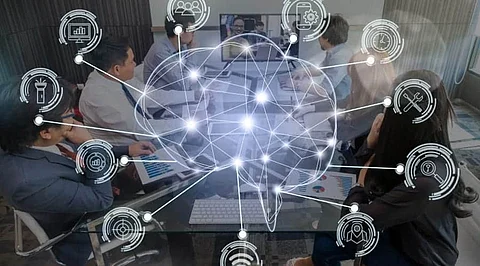
- Insights
- Cryptocurrencies
- Stocks
- White Papers
- Industry
- Geography
- Insights
- Cryptocurrencies
- Stocks
- White Papers
- Industry
- Geography


A few years back, Siemens introduced 'Internet of Trains', a concept where trains are monitored through IoT sensors, and the data generated is sent to machine-learning models, which generates insights and predicts downtimes through data analytics. It became a huge success since the trains were all on time and there were minimal operational errors. A Forbes article that covered this project says, "Siemens calls its smart rail infrastructure management platform Railigent. It is built on Teradata's Aster database and analytics and runs in the AWS cloud. In three years, the team working on dedicated rail service solutions has grown to 70 people with teams based in Germany, Moscow, and the US."
Internet of Things and Machine learning are two cutting-edge technologies that are disrupting industries and their operational structures in various ways. Although they have their capabilities, when combined can do wonders. IoT and machine learning can work together to increase operational efficiencies and minimize downtimes. According to a McKinsey article, the worldwide number of IoT-connected devices is projected to increase to 43 billion by 2023. IoT can connect devices across industries and supply the data to machine learning models at a faster pace.
Let us look over a few benefits of combining machine learning and IoT that can boost business efficiency.
IoT uses various sensors and nano cameras to monitor devices across the internet and transfers the data to machine learning systems. Machine learning algorithms are known for their capability to process huge datasets to obtain insights. IoT data enables machine learning systems to predict outcomes by analyzing the performance of various devices. Machine learning models analyze data to find anomalies, correlations, and predictions. Machine learning-based IoT data analytics is very useful in the healthcare industry to predict health conditions and telemedicine.
Efficient supply chain management, logistics, and rapid deliveries are expected from businesses these days. With a combination of IoT and machine learning, industries can gain better visibility into their supply chain and logistic operations. IoT sensors enable real-time tracking of vehicles and this helps in eliminating bottlenecks like unnecessary delays and diversions. IoT sensors help gain the location and product details to provide end-to-end visibility thus reducing costs and minimizing errors.
Machine learning models use the IoT data sets to reroute or predict disruptions in the supply chain and transportation. Machine learning can also provide insights on efficient paths for logistics thus reducing supply chain delays. UPS's On-Road Integrated Optimization and Navigation (ORION) technology to enhance supply chain management and logistics is an example. UPS reveals that since its inception, ORION has saved about 100 million miles and 10 million gallons of fuel per year.
Implementing IoT in workspaces can generate data on various business processes, which then can be fed to machine learning systems to gather insights. Machine learning analyzes the data to understand inefficiencies in workplaces and provide insights to reduce them. These technologies work together to increase productivity and design an efficient workflow pattern. Enterprises leverage AI, IoT, and machine learning to administer business process automation to reduce workload and operational costs.
Industry 4.0 has brought in digital transformation across the industries and introduced various disruptive technologies. IoT and machine learning are two of these cutting-edge techs that can redefine business operations together. Since machine learning is known for its predictive capabilities, IoT data can be used for risk management and understand market trends.
Machine learning, AI, and IoT combined enable enhanced customer personalization and experience which in turn will boost business growth. Smart cities are another beneficiary of this combination where everything runs on data and analytics. According to a McKinsey report, 50% of their respondents reported AI adoption in their companies in at least one business process.
AI and other technologies are here to stay and it will pave the way for more innovations to redefine business processes.
